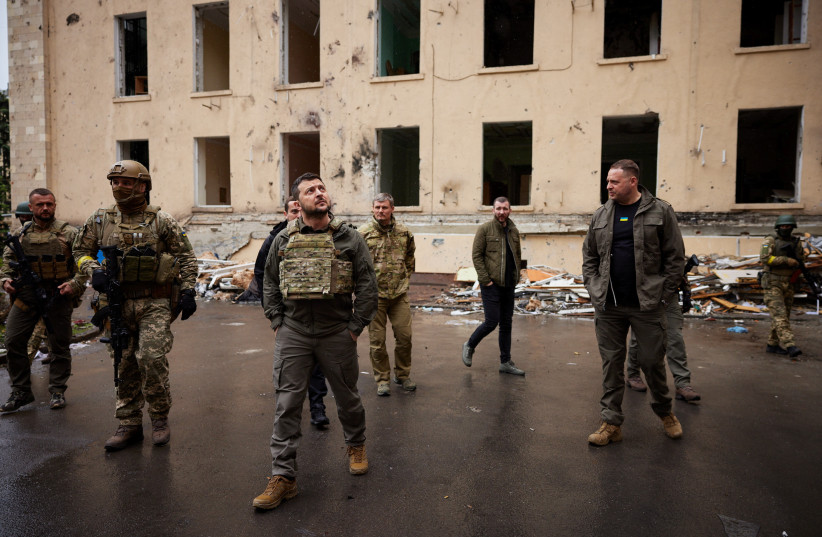Both the Israeli government and opposition are morally lost in their position on Russia’s invasion of Ukraine, former Mossad director Tamir Pardo said on Tuesday, at the Jewish People Policy Institute’s conference on morality in foreign affairs.
“Israel was on the fence because of security interests,” he said. “Israel thought it could benefit from two different worlds.”
Pardo, who recently became co-head of the JPPI’s geopolitics program, said despite a heavy push and criticism from both the US and the entire West, “Israel almost did not change its position at all” in being overly neutral toward Russia and refusing to aid Ukraine beyond humanitarian measures for an extended period.
Furthermore, the opposition in Israel was bizarrely quiet, and “it did not even exist” on the Ukraine issue, he said, suggesting that opposition leader Benjamin Netanyahu was at least as worried about offending Russia as was Prime Minister Naftali Bennett.
“There was not a single debate on the issue publicly in the Knesset,” said Pardo.
Regarding the speech that Ukrainian President Volodymyr Zelensky delivered to the Knesset on Zoom, Pardo was still critical of Israeli policy, saying the speech had been unnecessarily postponed. He also seemed to blame Israel for the conflicting messages between Zelensky and Israel regarding the speech.

"Israel was on the fence because of security interests…Israel thought it could benefit from two different worlds.”
Former Mossad director Tamir Pardo
He also criticized Israel for refusing to even provide defensive military gear, “such as helmets and other kinds of shields” from attack, for long stretches of the war.
Examples
Pardo was critical of a number of other decisions by Israel, slamming the government for failing to recognize the Armenian genocide perpetrated by Turkey out of fear of alienating Ankara.
For example, he criticized the government for failing to recognize the Armenian genocide perpetrated by Turkey, out of fear of alienating Ankara.
Pardo said Belgium, France, Canada and other countries in NATO are allies with Turkey, but they still recognized the Armenian genocide, but Israel seems more afraid of backlash from Turkey for recognizing the genocide than the other Western powers.
Pardo also discussed the case of Naama Issachar, an Israeli-American transit passenger flying from India to Israel who was arrested by the Russian authorities for alleged drug smuggling.
He seemed to disagree with the price the Israeli government was willing to pay to redeem Issachar from a Russian prison. He said even if the prison sentence given to her was disproportionate, she was no hero, and had even committed a low-level crime.
Finally, Pardo revealed that prior to the 2014 Gaza War, the cabinet may have approved the Shamgar Commission report’s ban on negotiating for captured Israelis in exchange for releasing terrorists.
However, Pardo said he himself had intervened and pushed hard so that the government would have a difficult time explaining to the Israeli public why a future potential group of kidnapped teenagers was killed by terrorists, when they could have been returned as part of an exchange if the government had not adopted a “no negotiations” policy.
Ironically, shortly after Pardo helped convince the cabinet not to adopt that policy, three Israeli teenagers were kidnapped in the West Bank.
IDF Maj.-Gen. (ret.) Yishai Beer, a professor at Reichman University, told the conference that the IDF needs more trained philosopher-type individuals involved in its targeting policy and decisions.
A lawyer and former senior judge, Beer said lawyers did not necessarily have a strong enough backbone to push back against some overly aggressive commanders’ ideas, and their notions of the world were sometimes too technical. This did not allow them the fluidity to be able to keep pace with some of the varied cases that come into play, he said.
This did not allow them the fluidity to be able to keep pace with some of the varied cases that come into play, said Beer.
Bar-Ilan University Prof. Yaffa Zilbershats disagreed, saying lawyers were just as capable as philosophers in understanding complex cases that do not fit into the letter of the law that they were used to in their textbooks.
IDF lawyers should be leaned on heavily for securing positive IDF targeting norms, she said.
Hebrew University of Jerusalem Prof. Moshe Halbertal said the key to a moral IDF was properly educating lower-level commanders who interacted most directly with rank-and-file soldiers.
